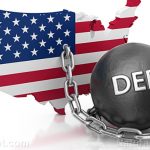
Can I borrow a dollar? 24% of Americans don’t have any money saved for an emergency
Monday, June 26, 2017 by Tim Wesley
http://www.risk.news/2017-06-26-can-i-borrow-a-dollar-24-of-americans-dont-have-any-money-saved-for-an-emergency.html

Shockingly, 24 percent of Americans won’t have any means to pay for food, medical care, shelter, education, and other items because they have no emergency funds. According to a new survey released by Bankrate.com, about one in four literally have no money saved for emergency situations; not even a single dollar.
Investopedia.com defines an emergency fund as “an account used to set aside funds needed in the event of a personal financial dilemma, such as the loss of a job, a debilitating illness or a major expense.” Having an emergency fund, according to the financial website, will help improve financial security by providing a safety net. This should allow you to take care of unwanted expenses and prevent you from getting into high-interest debts, like credit cards and unsecured loans.
Financial experts highly recommend that you have at least three months’ worth of expenses saved in an emergency fund. There’s no telling when you’d need to shell out money when you or a loved one fall ill, get into an accident, or get laid off. For prominent financial expert Suze Orman, it’s smart to put away money that’s enough to cover your expenses for an entire year.
But there’s a problem: Many Americans are unable to do that. In fact, at least 50 percent of Americans have zero cash stashed away for emergencies while the majority only have less than $1,000 saved.
That’s a very alarming picture of the financial situation of most Americans, as evidenced by various surveys. Data show that as many as 60 percent of Americans do not have the ability to shell out $500 if the need arises. What’s even more unsettling is one in five people would use their credit cards to pay for the expense. Additionally, more than one would loan cash from family.
Plastic money can be dangerous. If you’re not careful, you may end up in deeper trouble because you can easily accumulate more debt, pay for high interest rates, pay more for cash withdrawals and other fees and penalties.
There are several reasons why Americans are unable to save money for emergency use. One is the fact that people are more worried about spending on their dream vacations. One study found that 36 percent focus more on where to go next compared to the 32 percent that worried about having retirement money. It wouldn’t be surprising if more than half of the population retired broke.
Another reason is the inability to make wise decisions when it comes to settling debt. People who are in dire situations tend to make the mistake of paying bills like unsecured loans, instead of the ones that would have greater impact on their financial health, like mortgages or car loans.
Additionally, many are not upfront about their sources of income, even with their romantic partners. CreditCards.com reported that approximately 12 million Americans admitted to have kept their source of income secret.
There might be a light at the end of the tunnel. Evidence show that millennials, in general, are making wiser financial decisions.
- Twenty-three percent reported to have money that can tide them over for six months.
- Twenty-seven percent have three to five months’ worth of savings.
- Twenty-two percent have with money that can last for less than three months.
That’s better than nothing. As a whole, Americans are working hard to save up. Data showed that 31 percent has at least six months’ worth of savings.
And it’s not too late. Experts share the recommended savings an individual must have at a certain age bracket:
- Twenty-five percent of overall gross pay in your 20s,
- Equivalent of your annual salary by your 30s,
- Twice your annual salary by age 35,
- Three times your annual salary by age 40,
- Four times your annual salary by age 45, and
- Five times your annual salary by age 50.
Sources include:
Tagged Under: Tags: emergency funds, personal finance




